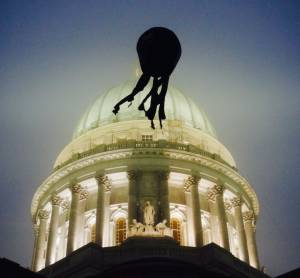By Janette Rosenbaum, 350 Madison

In November 2018, Wisconsinites will vote for a governor. This post is the sixth in a series on the environmental views of the candidates. This series is for information only. 350 Madison does not officially support any candidate.
What are the most important issues that you would take on if you were elected governor?
Mahlon Mitchell, Democratic candidate, named four issues that he would tackle if he won the governorship of Wisconsin.
“I think education is very important,” he began. Governor Walker has taken $1.6 billion away from education, Mitchell said, put back $630 million, “and called that progress.” In Mitchell’s view, this funding problem should be solved by giving more local control to school districts, including allowing each community to set its own tax base.
Second, Mitchell spoke about raising wages – specifically, implementing a $15-an-hour minimum wage – and restoring power to working people.
“The other thing is healthcare,” Mitchell continued. “We have over 300,000 Wisconsinites that don’t have any healthcare whatsoever.” Mitchell again criticized Walker, saying that the current governor didn’t take the Medicaid expansion offered by the federal government, and he should have. “We need to make sure that every person in Wisconsin has the ability to go to the hospital when they’re sick,” Mitchell said, “and not be one illness away from going bankrupt.”
Fourth, Mitchell says he would do something about the incarceration rate, citing the facts that Wisconsin ranks number one for “putting African-American males behind bars,” and also has the highest recidivism rate among the fifty states. “There’s a lot of things we can do to combat that,” Mitchell said. As examples, he named banning the box and “creating opportunities for people.” Ultimately, he said, we need to abandon our current top-down economy, and instead “create an economy from the bottom up, and make sure everyone has the opportunity to live a good life.”
Where would you rate environmental issues on your priority list?
“It’s at the top of the list,” Mitchell said. “There’s a lot of things we need to do in our state.” Like what? “We’re going to make Wisconsin believe in science again,” Mitchell quipped.
Mitchell stressed that one of the best things about Wisconsin is its abundance of natural resources, including its lakes, as well as opportunities to hunt and fish (activities Mitchell engages in himself). It’s crucial to protect those resources, he said, since they bring in billions of dollars of tourism revenue each year. “The DNR is a shell of its former self,” Mitchell lamented. The department needs to “bring back the folks that actually care about natural resources.” In addition to recreational uses, Mitchell pointed out that natural resources are important because everybody needs clean air and clean water.
Within the broad topic of the environment, what do you think are the most important issues?
“We need to make sure that we have good corporate partners,” Mitchell said, referring to the need for Wisconsin-based companies to be good environmental stewards. Naming a company that doesn’t meet that standard, Mitchell said that Foxconn “has overpromised and underperformed a lot of times.” Mitchell gave two examples of environmentally-unfriendly behavior the foreign company is expected to engage in: taking 700,000 gallons of water a day from Lake Michigan, and discharging dangerous chemicals. Mitchell thought that these kinds of actions should be prohibited by “stricter environmental standards,” including regulations intended to “improve the quality of our waterways.”
Returning to the topic of the DNR, Mitchell said that the department needs to be fully staffed, and the secretary in particular must be carefully chosen for their objective qualifications. “There shouldn’t be any partisan issues when it comes to something like our environment,” Mitchell said, adding that we need to “bring the scientists back in order to make sure we’re doing everything we can to take care of our natural resources.”
Where would you rate climate change on your priority list?
“I believe in climate change,” Mitchell told us. “It’s very important. Our president pulling out of the Paris Agreement is horrible. As a state, I would make sure we’re a state that is in the Paris Agreement. [This priority is] ranked very high.”
Before we asked specifically what Mitchell would do about this challenge, he said that he would implement tax cuts for businesses and homeowners that are looking to invest in solar and wind energy.
If you were elected governor, what would you do to address climate change, and how soon would you do it?
Mitchell answered this question by explaining one of his campaign promises: if he is elected, he will transition Wisconsin’s government buildings to 100% renewable energy by 2030, and will work towards the entire state being powered by 50% renewable energy before 2040.
Mitchell also said, “We have to regulate our cars. We have to make sure our emissions standards are up to par.”
As for how all of this would be brought about, Mitchell said, “I would bring stakeholders to the table and work on real solutions and put together a long-term plan and goal.”
“I’m not a scientist,” said Mitchell, who has pursued a career as a firefighter. “You need to bring people to the table that actually know more about those types of things. And that’s what a leader does.”
Do you know what Line 61 is?
Mitchell couldn’t answer this question. Asked “What do you know about Enbridge?”, he admitted, “Not much.” When 350 Madison asked, “What are tar sands?”, Mitchell identified that substance as a commodity transported on trains.
After a crash course in Line 61, Mitchell said that “we need to protect our marshlands and our resources,” and expressed interest in learning more about the pipeline.
Anything else?
At the end of our interview, Mitchell summarized his campaign: “We’re building a wide coalition to work together to beat Scott Walker.”
